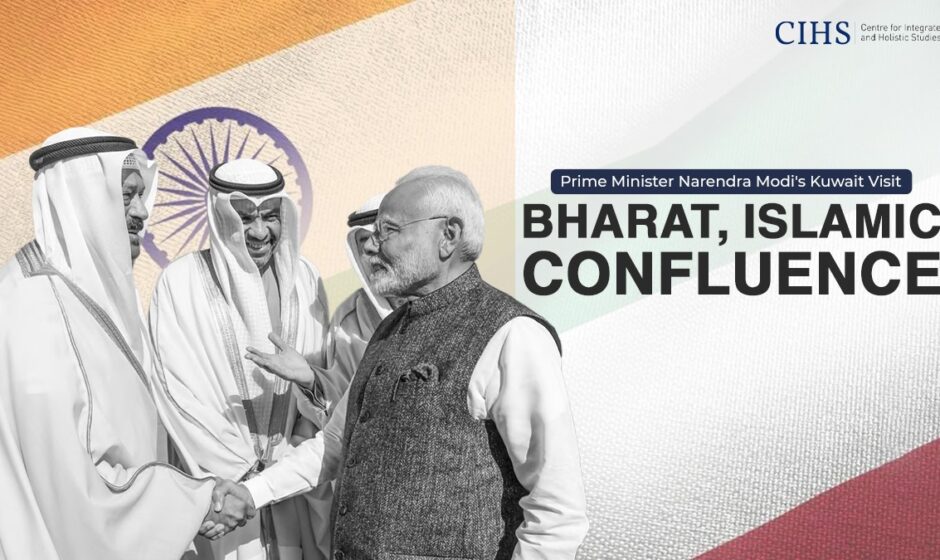From Decades of Dormancy to Dynamic Diplomacy: How PM Modi’s Kuwait Visit Redefined Bharat’s Global Engagements.
Vinod Kumar Shukla
There is a misnomer that foreign policy of any country remains more or less the same while governments come and go. This is not true. Actually, it changes with the kind of government a country has from being submissive to assertive. Look at the case of Bharat where, ever since Prime Minister Narendra Modi took over, engagements with gulf countries have been of mutual interest by de-bracketing them from solely being Islamic nations, a great departure from the erstwhile Pakistan-centric foreign policy. Bharat has made its Western neighbour’s self-styled claim of being a stakeholder everywhere especially with Islamic nations meaningless. The engagement of Bharat with rest of the global communities are on equal footings.

Ushering in a new era of global engagements, Prime Minister Narendra Modi expressed his concern during his Kuwait visit from December 21-22, 2024 stated that “it takes four hours to reach Kuwait from India but it took four decades for the Prime Minister.” This is despite the fact that over a million people of Bharat in Kuwait are the largest expatriate community which is regarded as the community of first preference among expatriates. The Gulf nation is a key source of investment for Bharat from the current president, Shaikh Mishal Al Ahmad Al Jaber Al Sabah, the Amir of Kuwait, of the Gulf Cooperation Council (GCC). Approximately 89 per cent of the total FDI from the GCC has been received in the last decade and bilateral trade between India and Kuwait in the last financial year was over $10 billion.
The PM’s Kuwait visit is to further strengthen bilateral ties, operationalise security agreements that have been moving at a snail’s pace. Prime Minister Modi has been trying to make West Asia a trade gateway for the rest of Asia and Europe and create a business-friendly environment to invite and secure investments in the region. Bharat’s bilateral relations with most of the Gulf countries by de-bracketing Pakistan is no less than an achievement for any government. Now most of the countries are keen on deeper bilateral ties. But the way Kuwait facilitated PM’s interactions with diaspora and respected New Delhi’s sensitivities on cultural and religious matters, it clearly indicates Bharat’s growing diplomatic clout not only in the region but globally as well.
West Asian countries are generally considered as oil supplying nations but Modi dispensation looks at them with mutual trust and opportunity in gamut of issues. Besides trade, regional security is another concern. The ongoing Israel-Hamas conflict and post-Assad instability in Syria are matters of concern. They are not only impacting regional security but also business prospects. Diplomatically cornering Pakistan, the two sides unequivocally condemned terrorism in all its forms and manifestations, including cross-border terrorism and called for disrupting of terrorism financing networks and safe havens, and dismantling of terror infrastructure during PM’s visit. They agreed to enhance cooperation in counter-terrorism operations, information and intelligence sharing, developing and exchanging experiences, best practices and technologies, capacity building and to strengthen cooperation in law enforcement, anti-money laundering, drug-trafficking and other transnational crimes. The two sides discussed ways and means to promote cooperation in cybersecurity, including prevention of use of cyberspace for terrorism, radicalisation and for disturbing social harmony.
Defence cooperation is another area of mutual benefit and a Memorandum of Understanding (MoU) was signed between India and Kuwait to institutionalize bilateral cooperation in defence that included training, exchange of personnel and experts, joint exercises, cooperation in defence industry, supply of defence equipment, and collaboration in research and development, among others. India is gradually emerging as a defence exporting nation in a big way with its Make in India programme.
The other issue that is very dear to the PM is solar energy (green energy) and making an oil exporting country like Kuwait the member of International Solar Alliance (ISA) is certainly a big deal. The world knows it well that solar energy is the future as fossil fuels are not forever. The ISA collectively covers the deployment of solar energy and addresses key common challenges to scale up its use to help member countries to develop low-carbon growth trajectories. Reducing carbon footprint is a global challenge and India has lived up to its global commitment. It wants others including developed nations to follow suit.
Cultural linkages with West Asia are age-old and Bharat has always been wanting to continue which the PM has always been mentioning in his speeches. An understanding about Cultural Exchange Programme (CEP) between India and Kuwait for the years 2025-2029 has been reached about which would facilitate greater cultural exchanges in art, music, dance, literature and theatre, cooperation in preservation of cultural heritage, research and development in the area of culture and organizing of festivals.
Sports is another area where India needs to do better and cooperation with friendly nations will help them to excel together. Executive Programme (EP) for Cooperation in the Field of Sports
(2025-2028) is a similar measure that India and Kuwait have arrived at during PM’s recent visit which will strengthen bilateral cooperation in the field of sports by promoting exchange of visits of sports leaders for experience sharing, participation in programs and projects in the field of sports, exchange of expertise in sports medicine, sports management, sports media, sports science, among others.
Most importantly, the persona and initiatives of Prime Minister Narendra Modi has been so overwhelming that Kuwait has bestowed upon him its highest knighthood order ‘The Order of Mubarak Al Kabeer’ which is the 20th international honour given to him. During his visit, the PM met with Crown Prince of Kuwait Sheikh Sabah Al-Khaled Al-Hamad Al-Mubarak Al-Sabah and discussed the importance to Bharat’s bilateral relations with Kuwait acknowledging that bilateral relations were progressing well and welcomed their elevation to a strategic partnership. They emphasized on close coordination between both sides in UN and other multilateral fora where India is not only seeking major reform and is emerging as an important player. In the context of the UN reforms, both leaders emphasized on the importance of an effective multilateral system as a key factor in tackling global challenges. They stressed upon the need for UN reforms, including of the Security Council through expansion in both categories of membership, to make it more representative, credible and effective.
When the PM held talks with Prime Minister of Kuwait Sheikh Ahmad Al-Abdullah Al-Ahmad Al-Sabah, the core focus was around a roadmap to strengthen strategic partnership in areas including political, trade, investment, energy, defence, security, health, education, technology, cultural, and people-to-people ties. But the most important among them was to further deepen economic cooperation. The PM invited a delegation comprising Kuwaiti Investment Authority and other stakeholders to visit India to look at new opportunities in the fields of energy, defence, medical devices, pharma, food parks besides some other areas like cooperation in traditional medicine and agricultural research. They signed a Joint Commission for Cooperation (JCC) under which Joint Working Groups in the areas of trade, investment, education, technology, agriculture, security and culture have been set up in addition to the existing JWGs on Health, Manpower and Hydrocarbons. As part of the activities under the MoU between Sheikh Saud Al Nasser Al Sabah Kuwaiti Diplomatic Institute and the Sushma Swaraj Institute of Foreign Service (SSIFS), both sides welcomed the proposal to organize the Special Course for diplomats and Officers from Kuwait at SSIFS in New Delhi.
Bharat extended helping hands to Kuwait when an Indian medical team travelled to Kuwait in April 2020 to help fight COVID-19. A consignment of 200,000 doses of Covishield vaccines was supplied to Kuwait in February 2021. During the second wave of COVID-19, Kuwait reciprocated. Modi is working to clear dust from the relations that were gathered with the passage of time and remained unattended. The PM has created such an environment where the global community is looking at Bharat with a new hope.
(Author is a senior journalist and associated with Centre for Integrated and Holistic Studies, a non-partisan think-tank based in New Delhi)



